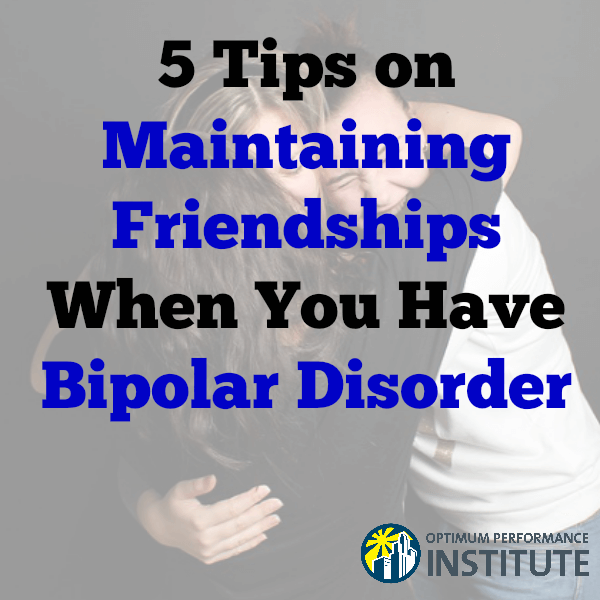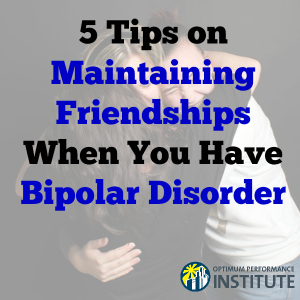
5 Tips on Maintaining Friendships When You Have Bipolar Disorder
 I received a text from a college friend last week asking me if I’ve ever noticed him “acting manic-y.” He explained that his girlfriend suspected he was bipolar and wanted him to seek professional opinion. This conversation made me think about the experiences I’ve had with participants here at Optimum Performance Institute (OPI). I’ve observed new participants entering the program starting to make friends and then witnessed those friendships fall apart.
I received a text from a college friend last week asking me if I’ve ever noticed him “acting manic-y.” He explained that his girlfriend suspected he was bipolar and wanted him to seek professional opinion. This conversation made me think about the experiences I’ve had with participants here at Optimum Performance Institute (OPI). I’ve observed new participants entering the program starting to make friends and then witnessed those friendships fall apart.
I’ve also seen some develop relationships that were very healthy and lasted beyond treatment.
So, what are the distinguishing factors between the relationships that have failed and those that have gone on to flourish? We all experience emotional ups and downs. For those with bipolar, these experiences may be more pronounced. What is it that keeps friends together despite the symptoms of bipolar when so many others fizzle out? I believe with the right tools, support, and practice, people with bipolar can maintain healthy friendships. I see it in my work all of the time.
After some research and good old fashioned soul searching, I’ve come up with a few tips:
COMMUNICATION
When feeling the need to isolate, it’s perfectly acceptable to tell a friend that you need some “me” time or that you need space. No need to go into details, just gently assure your friend that it isn’t anything they said or did. In addition, be accepting and supportive when your friend needs alone time as well. Setting healthy boundaries in this way prevents misunderstandings.
LEVELS OF FRIENDSHIP
Having a different friend, or friendly acquaintance, for different needs is very healthy. Accept that not everyone has to be your “BFF.” For example, one friend may be your support group friend, another your study buddy, another your roommate, etc. You may not see them every day, but you know exactly who will help you out when you are overwhelmed by that big exam coming up!
SUPPORT TEAM
When you need support, take a moment to be mindful of the kind of support you need, and take appropriate action. Establish your own go-to support team so that you are not “unloading” on one person, since this will likely push that person away after long. For example, a therapist, doctor, counselor, life coach, sponsor, or peer from your mental health program are all appropriate people to turn to in addition to family and friends.
COMING OUT
The decision whether to tell someone about your illness can be a tough one. Fear and stigma can cloud your friend’s mind when hearing the word “bipolar.” At the same time, keeping your friend may be easier when they know about your condition, and it may be easier for you to communicate. The choice is yours only when you are ready. If you have a hard time trusting a friend with this personal information, try finding a support group or mental health program.
MAKING AMENDS
Sometimes when an episode of depression or mania come along, we do or say things that we didn’t mean. This also happens to people who do not suffer from bipolar disorder. When feeling better again, it’s important to make amends as soon as possible. When apologizing, state what for, and then reassure them. Don’t make promises you can’t keep, however assure them you are getting treatment and working on it. If they want to talk about it, make sure to actively LISTEN in return. Validate their feelings. Everyone wants to feel heard. Your friend may need some space before they are ready to talk, or even after talking. In this case, be mindful of tip one.
Although these tips are focused mainly on those who may be dealing with bipolar symptoms, they can be adapted for pretty much anyone struggling to maintain a relationship. I encourage you to get out of your “comfort zone,” take some “baby steps,” and implement one or two of these tips into your life. You (and your friends) might be glad you did!
by Elizabeth Pfeiffer
Independent Living Specialist
Optimum Performance Institute
For more information on OPI residential programs and our measures to help young adults with Bipolar Disorder, call us at (888) 814-5985 or click HERE to submit an online form. We’ll be in touch promptly.
